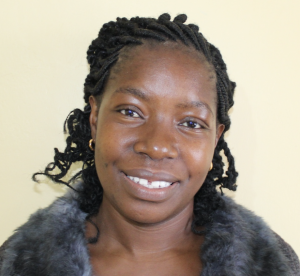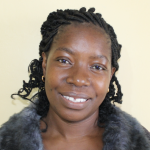The ten staff members at Kimwenge Dispensary struggle to access sufficient water to care for the patients they serve. On average, the clinic has 90 outpatients daily, so sufficient, clean water is a primary concern that is essential for proper care and to promote good health.
The clinic's primary water source is a small rain tank, but when that goes dry, the clinic has no option but to pay outside water vendors, send workers out to beg local community members for water, or resort to unprotected community sources.
However, this solution does not promote health at the clinic because the water being collected is often contaminated, leading to waterborne illnesses for staff and patients alike. Paying for water is also an expensive endeavor stretching the clinic's already minimal budget for operations.

"The small plastic rainwater collection tank at the dispensary does not provide enough water for the users. Quite often water is exhausted from the tank in 2 days after it stops raining. That is why the management regulates water from the tank to be strictly used for drinking. Water for cleaning, washing hands, and cooking is bought from water vendors on a daily basis," said field officer Christine Masinde.
"Since the facility and the community around do not have access to a reliable, safe, and clean water source, the facility staff indicated that most patients treated at the hospital suffer from waterborne and water-related illnesses like malaria, pneumonia, diarrhoea, typhoid, and stomachache. Staff also get sick and are unable to attend to the sick who really need the health services of the only available facility in the area," continued Christine.
"A healthcare facility needs [an] adequate supply of clean water at all times because you cannot predict what services will be needed by patients who come," said 54-year-old nurse Bernadina Imbatswa.

"Like one time, a pregnant woman who was in labor came [to] our dispensary, and on checking her, she was at [the] second stage of labour. It was a case of emergency! We had to deliver the baby because if we referred her to another facility that provided maternity services, it would have been a risk to the baby and the mother. Unfortunately for us, there was little water left, yet this exercise required [a] good amount of water for handling [the] delivery of the baby and cleaning up after the baby is born. One of the workers had to rush to one of the neighbouring homesteads to request for water to save the situation. Luckily the baby was delivered successfully, and we had water to clean up afterwards. My prayer is that we get a reliable water [source] so that we can expand and improve services offered to the many patients who come to seek medical services."
The people living in this community need to have a health clinic they can turn to when they have health challenges, especially emergencies, but that is very difficult to do when the center does not have access to clean water.

"I get sick frequently because I consume water which is not safe for drinking. When I come to the dispensary for treatment, I hardly get water to wash my hands, and there is no sanitizer too. I can easily spread germs to others or get infectious diseases from other patients. I hope one day we will never have to worry about safe drinking water and [an] adequate supply of clean water for washing hands," said 10-year-old Gaellah A. (shown above).
Installing a borehole well will enable the clinic staff to access water whenever needed to provide care. In addition, the hygiene of the center will improve, and patients and local residents will have a reliable water source they can depend on that won't make them sick.
The Proposed Solution, Determined Together...
At The Water Project, everyone has a part in conversations and solutions. We operate in transparency, believing it benefits everyone. We expect reliability from one another as well as our water solutions. Everyone involved makes this possible through hard work and dedication.
In a joint discovery process, community members determine their most advantageous water solution alongside our technical experts. Read more specifics about this solution on the What We're Building tab of this project page. Then, community members lend their support by collecting needed construction materials (sometimes for months ahead of time!), providing labor alongside our artisans, sheltering and feeding the builders, and supplying additional resources.
Water Access for Everyone
This water project is one piece in a large puzzle. In Kenya, Sierra Leone, and Uganda, we're working toward complete coverage of reliable, maintained water sources that guarantee public access now and in the future within a 30-minute round trip for each community, household, school, and health center. One day, we hope to report that this has been achieved!
Training on Health, Hygiene & More
With the community's input, we've identified topics where training will increase positive health outcomes at personal, household, and community levels. We'll coordinate with them to find the best training date. Some examples of what we train communities on are:
- Improved hygiene, health, and sanitation habits
- Safe water handling, storage & treatment
- Disease prevention and proper handwashing
- Income-generation
- Community leadership, governance, & election of a water committee
- Operation and maintenance of the water point
Handwashing Stations
Alongside each water source, we also provide two new gravity-fed handwashing stations that will allow everyone at the health center to wash their hands without running water. Handwashing is so important to help prevent illnesses, especially at a health center where hygiene is critical to vulnerable patients.
The health center staff will maintain the stations, fill them with water, and supply them with soap.
VIP Latrines
In addition, we will construct two Ventilated Improved Pit (VIP) latrines designed to prevent fecal disease transmission. Each latrine will have a cement floor, which is easy to use and clean regularly.

 Borehole Well and Hand Pump
Borehole Well and Hand Pump
 Rehabilitation Project
Rehabilitation Project


































